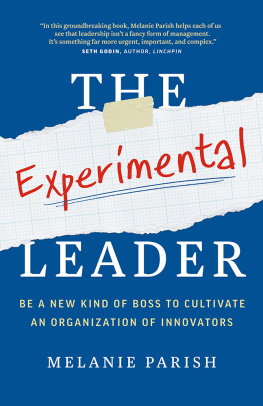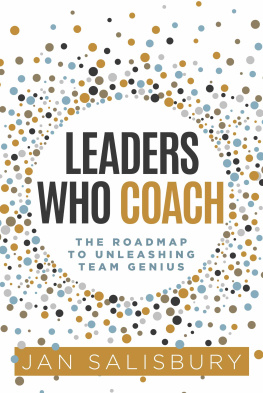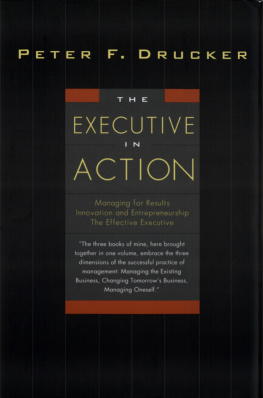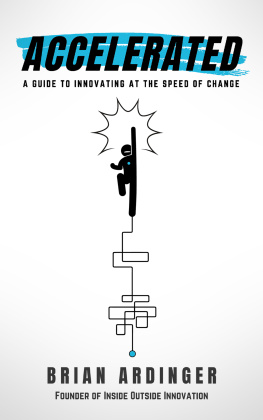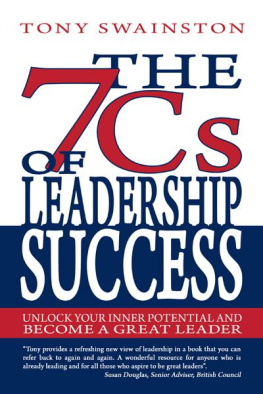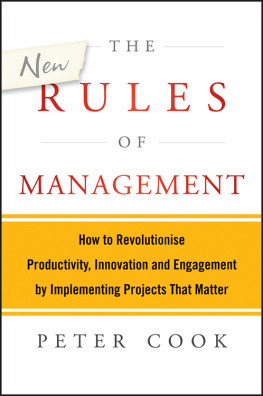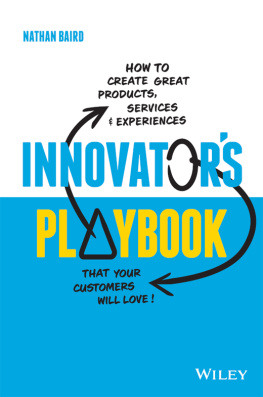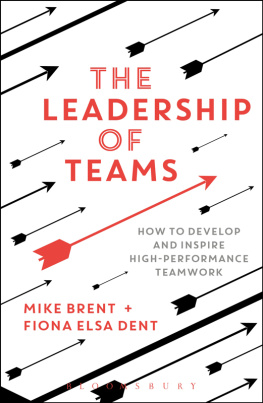Praise for The Experimental Leader
If failure is not an option, then neither is success. In this groundbreaking book, Melanie Parish helps each of us see that leadership isnt a fancy form of management. Its something far more urgent, important, and complex.
Seth Godin author, Linchpin
In The Experimental Leader, Melanie Parish has brilliantly applied the principles of DevOpsculture, communication, autonomy, feedback, and experimentationto leadership fundamentals. Enumerated in the book are tactical steps you need to embrace a growth mindset in your daily work (and life) as a leader in tech. Youll find yourself reflecting on your leadership style, reevaluating your teams mission and vision, and enabling everyone in your organization to iteratively improve. Whether you currently manage a team or have your eye on the C-suite, this book is the first step in actualizing your leadership potential.
Emily Freeman principal cloud advocate, Microsoft; best-selling author of DevOps for Dummies
For technology companies, building tools to pilot product features and optimize customer experience with A/B testing and measurement of real-world interactions are not new. And yet, applying these same techniques to improving how our organizations perform their work is surprisingly nascent. Melanie Parish delves deeply to illustrate what it looks like when leaders, at all levels, apply the time-tested techniques of inquiry, evaluation, and constant refinement to a new frame: the daily practice of our work, how groups engage with each other, and ultimately how value is delivered. It works for apps beloved by billions, and it can work just as effectively for your teams and your business... and The Experimental Leader shows you how.
J. Paul Reed senior applied resilience engineer, Netflix
The Experimental Leader provides an entirely new way of approaching leadershipone that offers a methodical and measurable way to achieve real progress in creating a culture of innovation. By applying a scientific, experimental, and modern mindset to leadership, Melanie Parish not only shows leaders how to shed old, unhelpful habits but also gives them the tools to strive forand achievebetter outcomes.
Dr. Allison Sekuler Sandra A. Rotman Chair in Cognitive Neuroscience and vice president, research, Baycrest Health Sciences; managing director, the Rotman Research Institute and the Centre for Aging + Brain Health Innovation; professor, University of Toronto and McMaster University
Ive been in a leadership position in my profession for over twenty years and The Experimental Leader has given me an opportunity to refresh my approach to working with my team. I navigate, on a daily basis, a fast-moving and multifaceted environment on a television show. The Experimental Leader helped me to evaluate my current leadership skills and to identify and troubleshoot in areas where I will see positive change for myself and my team. I look forward to using experiments and techniques such as gemba walks and utilizing the Test the Theory questions in each chapter. I will return to this book again and again. My best takeaway from The Experimental Leader that I will apply to my daily leadership challenges is Intents describe what will be accomplished. Your people determine how the work will be done.
Shawn Reeves Emmy-winning costume designer
In TheExperimental Leader, Melanie Parish unveils a new way to leadone that applies the analytical techniques that have driven technological progress to the leadership realm. Its a remarkable new approach to fostering a culture of innovation that not only works but is long overdue!
Haylie Pomroy #1 New York Times best-selling author, motivational speaker, and ecommerce CEO of HayliePomroy.com
In The Experimental Leader, I find Melanie Parish to be inquisitive, insightful, and brave. She asks good questions that have challenged me to think about situations that I face as a leader. Melanie outlines her leadership philosophy and translates this into an accessible menu of strategies that leaders can adopt to support their effectiveness. A good read!
Stephanie Ounpuu PhD, head, Global Trial Management (pharmaceuticals)
In the digital age, leaders are being called on to be more innovative, more creative, and more flexible than ever. And now, they have the means to do so. Melanie Parish shows leaders how to apply the rigorous methodology of scientific experimentation to create a culture of innovation and achieve continuous improvements. Its a radical new approach to leadership that is long overdue!
Libby Robinson managing partner of Integral Leadership & Coaching
I love the approach to leadership plainly outlined in The Experimental Leader. It gave me access to a new framework and practice to use in my work with our engineering teams.
Greg Poirier infrastructure architect, New Relic
Melanie Parish hits the nail on the head with her new book The Experimental Leader. She shows people who lead innovation how to succeed in the world of entrepreneurism.
William Rutherford president, Rutherford Investment Management, state treasurer of Oregon, 1984 to 1987
The Experimental Leader provides clear concepts that will challenge your core beliefs about what makes an effective leader. Whether you are a seasoned professional or someone aspiring to reach a leadership position, this book is full of powerful insights that will make lasting impressions for anyone wishing to improve their leadership skills.
Sabrena Dorris senior leader (health care)
Melanie Parish takes concepts she teaches in her coaching practice and distills and packages them for smooth consumption in book form. The Experimental Leader is thought provoking and practical. It is accessible to technical as well as business people.
Paul Hammant CIO , software industry pundit, tool maker, practice documenter, and an early cocreator of Selenium (test automation software)
I n the organizations I work with, in all corners of the globe, I meet smart, committed, driven leaders. But, nearly categorically, these leaders arent quite sure how to lead in todays climate of innovation. They do know, however, that they need to be doing somethingand fastbecause we live and work in a relentless culture, and they understand that if they are not fostering a culture that creates something new, their organization will become obsolete. For leaders in an already successful organization, creating something new means knowing the marketplace and the competition, and looking for ways to leapfrog forward, all while conducting high-quality business as usual.
In this context, at any point, a new player might enter from left field, disrupting the marketplace and knocking the champions right out of the game. Think of the early 2000s, when streaming and Netflix antiquated Blockbuster Video; or when the iPhone made the BlackBerry obsolete; or when Amazon outmoded the department store Sears. Rarely does an older, established company disrupt the marketplace. However, it can remake itself to survive into the future. For example, while Blockbuster and Sears havent had favorable outcomes, BlackBerry is reinventing itself in the tech security space and was recently listed on The Motley Fools buy list. Establishing internal skills to innovate can help a company survive in a constantly demanding marketplace.
Modern-Day Alchemy
In the Middle Ages, alchemy was the dream that somehow, through study and magic, people could turn lead into gold. Innovation has become our modern-day alchemists fantasy: the dream of turning the raw materials of knowledge and insight into pure gold. We look to titans in the technology sector, in particular, to illustrate the possibilities of this fantasy. Bill Gates and Paul Allen inventing the personal home computer and Steve Jobs introducing the iPhone are examples of what we expect twenty-first-century innovation to look like: it should provide novelty, disruption, and wealth.

